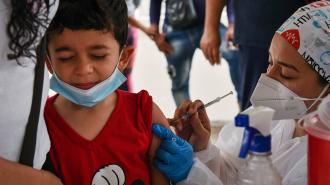Moderna has applied for FDA approval for its COVID-19 vaccine for children ages 6 months through 5 years old. Results from a large phase 2/3 trial showed significant efficacy and no major safety issues from two low doses of the vaccine.
“We believe [the vaccine] will be able to safely protect these children against SARS-CoV-2, which is so important in our continued fight against COVID-19 and will be especially welcomed by parents and caregivers,” said Moderna CEO Stéphane Bancel.
The situation: In October 2021, the FDA authorized Pfizer and BioNTech’s COVID-19 vaccine for children ages 5 through 11. Since then, kids under the age of five have been the only demographic in the US without an available vaccine.
“We’ve been kind of left behind as everybody else moves on,” Meagan Dunphy-Daly, a Duke University marine biologist, told AP News. “I will feel such a sense of relief when I know my boys are vaccinated and that the risk of them getting a serious infection is so low.”
Kids under the age of five are the only demographic in the US without an available vaccine.
Why it matters: While young children tend to have much milder COVID-19 cases than seniors and adults, they can still develop severe infections, and nearly 400 American children under 5 years old have died from COVID-19 since the pandemic began, according to the CDC.
Children can also give COVID-19 to adults who are at greater risk. While the vaccines don’t prevent infection nearly as well against the Omicron variant as they did against the original strain, they do offer some protection against transmission.
Tot-sized shot: Moderna’s phase 2/3 KidCOVE study included 6,700 children ages 6 months to under 6 years. Kids in the treatment groups received two low doses of vaccine, 28 days apart.
This is the same formula approved for adults, but each dose was only one-quarter the size of the adult dose.
In children ages 2 to 5 years, the vaccine was 37% effective against symptomatic infection, and in children between 6 and 23 months, it was 51% effective.
These results indicate that the immune response in kids is comparable to adults.
This is much lower than the 95% efficacy in the original trial for adults back in 2020. The Omicron variant, behind nearly all of today’s infections, can be blamed for that big drop — Moderna says the vaccine’s efficacy against infection in kids is about equal to what it estimates for adults against Omicron.
The most important thing, however, is that these results indicate that the immune response in kids is comparable to adults, where this level of immunity provides strong protection against severe disease.
Nonetheless, the FDA appears to be planning to sit on the vaccine’s application.
Confused yet? A Moderna official told the New York Times that the company expects to finish submitting data to the FDA by May 9.
Three people with knowledge of the matter have told POLITICO that a ruling on Moderna’s COVID-19 vaccine for children might not happen until June, because the FDA wants to authorize it and Pfizer’s three-dose vaccine for young children — which is still in trials — at the same time.
“Two products that are similar but not identical, particularly with regard to the dose, and what the FDA wants to do is to get it so that we don’t confuse people to say, ‘This is the dose. This is the dose regimen for children within that age group of 6 months to 5 years,’” Anthony Fauci, the government’s leading infectious disease expert, told CNN.
“It doesn’t matter if it’s Moderna or Pfizer or both. Let’s get these kids vaccinated.”
Sunanda Gaur
Delaying the vaccine for this reason has garnered criticism from parents, experts, and lawmakers.
“If I sign a waiver saying ‘I don’t find this confusing at all,’ can I go ahead and get the vaccine for my four-year-old?” Whet Moser, a NYT writer and parent, tweeted.
The big picture: It’s likely at least one COVID-19 vaccine for children under the age of five will be authorized some time this year. Less certain is how many parents will actually have their toddlers get the shot — less than 30% of 5 to 11 year olds have gotten both doses of Pfizer’s vaccine, which was approved in October 2021.
Still, the parents who do want to vaccinate their young children are eager to see the shot reviewed and, hopefully, authorized as soon as possible.
“The sooner the better in my mind. It doesn’t matter if it’s Moderna or Pfizer or both,” Sunanda Gaur, a pediatrics professor at Rutgers University, told the Washington Post. “Let’s get these kids vaccinated. Let’s get started, and if they need a booster, they’ll get a booster later on.”
We’d love to hear from you! If you have a comment about this article or if you have a tip for a future Freethink story, please email us at [email protected].






